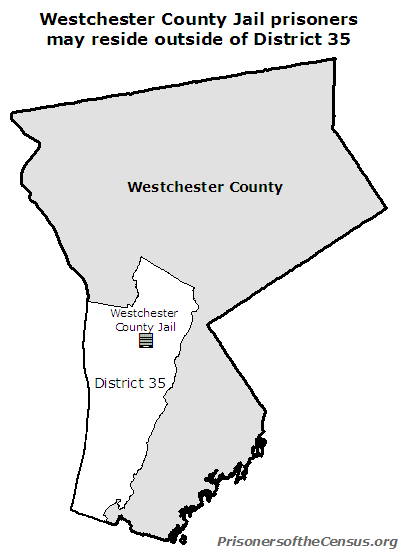Judge in Westchester voting recount says homeless shelter can, but jail cannot, be a residence
by Peter Wagner, January 3, 2005
The winner of the New York 35th Senate district race is still undecided two months after the election. Lawyers for both sides are disputing how ballots were handled, as well as which absentee and provisional ballots should be counted in this very close race. Republican incumbent Nicholas A. Spano has a narrow lead in the recount, and he has sought to disqualify many of the uncounted ballots in order to preserve that lead.
Initially challenged were the votes of two homeless women. They testified on December 9 that they had lived at the homeless shelter long enough to make it their residence. Lawyers for both sides agreed with the judge that the women’s votes should be counted.
But 7 prisoners in the Westchester County jail were not so lucky. Lawyers for the incumbent successfully argued that a jail can not be a residence, and so the votes were disqualified. Although convicted felons serving time in prison or on parole cannot vote in New York, people awaiting trial or serving short misdemeanor sentences retain the right to vote. Thus people in jails should generally be allowed to vote. But where?

District 35 is just a portion of Westchester County, although it happens to be the portion that contains the jail. (See map at right.) But the people in the Westchester County Jail may be from anywhere in the county or perhaps even outside of the county. As I’ve argued previously, the New York Constitution is clear that a prison is not a residence:
“no person shall be deemed to have gained or lost a residence, by reason of his presence or absence … while confined in any public prison.” (New York State Const. Article 2, Section 4.)
It is unfortunate that the people who processed the voter registrations for these 7 prisoners and sent them the absentee ballots didn’t make it clear that a prison can be a temporary mailing address but not a voting residence. Those 7 prisoners had the right to have their votes counted, but not as residents of the jail. This no doubt left the Judge with a dilemma: Can the votes of these 7 prisoners for senator in District 35 be counted when we don’t even know what district they live in?
The Judge apparently decided that it wasn’t necessary to bring the prisoners in to court to investigate further and just decided to exclude the ballots. I don’t know whether investigating further was a factual or legal option, but the result is quite consistent with the idea that election districts should be built around the concept of residence as the place you willingly choose to be. A prison cannot be a residence because the people there are confined against their will. A prisoner’s residence remains the place they lived prior to incarceration.
The only exception to that rule is the Census Bureau’s method of assigning residence during the decennial census. The Census counts prisoners as residents of the facility, but it would have been hard for someone to use the Census as a reason to count these 7 ballots. The Census Bureau’s method of assigning residence to prisoners predates both the modern concept of redistricting and the New York State Constitution’s explicit declaration that a prison is not a residence.
We can draw at least two lessons from the crisis in District 35:
1. Election officials should be given clearer guidelines on absentee ballots from enfranchised jail inmates so that their ballots may be counted in the proper location and not discarded.
2. The Census Bureau should change its method of counting incarcerated people, and start assigning them to their pre-incarceration homes. District 35 was built in part around the Census counts of the jail because that was the only population data available to the New York Senate. But with both the incumbent and a Judge saying that the prisoners reside elsewhere, the Census should start counting them elsewhere as well.
Note: Thanks to Jeff Wice, Alec Ewald, and Rick Hasen’s Electionlawblog.org for in various ways bringing Lisa W. Foderaro’s “Judge Hears Testimony of Improper Voting by Poll Workers in a Westchester Race” article in the December 10, 2004 New York Times to my attention.



